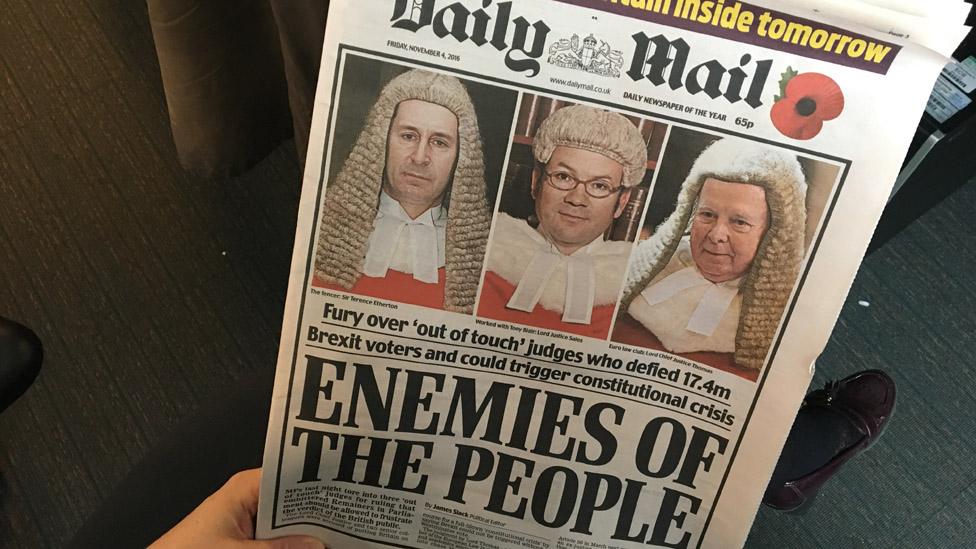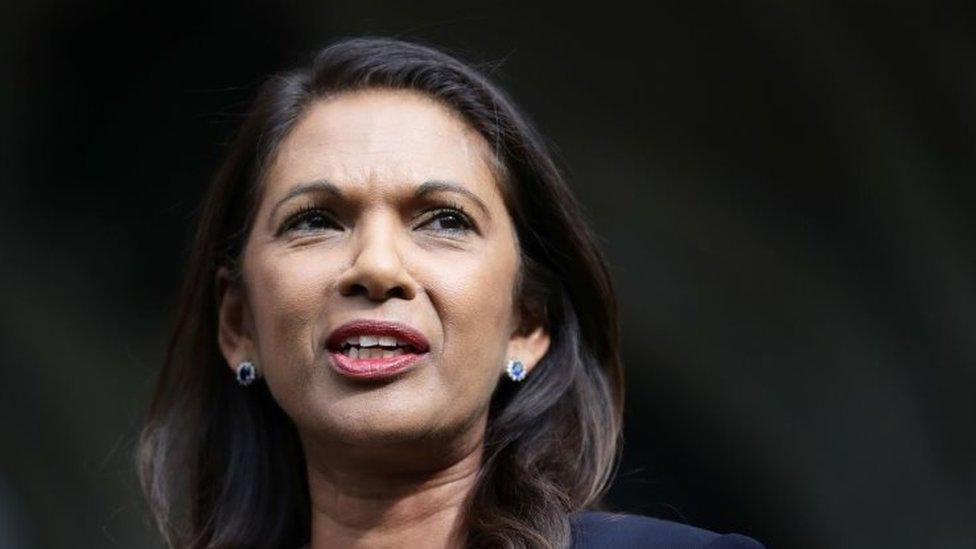Judicial review: 'Snarling' not the way to get reform, says former top judge
- Published

Lord Sumption was a Supreme Court justice from 2012 to 2018
"Shouting and snarling" is not the way to get judges to accept curbs to their powers, a former top judge has warned.
Lord Sumption said the judiciary was likely to accept "reasonable" measures to address government concerns they are meddling in politics.
But he said the government would be mistaken if it thought "abuse" was the way to "get things done".
Prime Minister Boris Johnson has ordered a review into the relationship between government and the courts.
Later this year, the government will launch a wide-ranging Constitution, Democracy and Rights Commission to take an "in depth" look at the issue. There will also be a separate Royal Commission on the criminal justice process.
'Not revenge'
The 2019 Conservative manifesto said: "We will ensure that judicial review is available to protect the rights of the individuals against an overbearing state, while ensuring that it is not abused to conduct politics by another means or to create needless delays."
The government has so far released few details about how the commission will work and how far it wants to go in limiting the power of judges to overturn government decisions.
The commission will be overseen by Cabinet Office minister Michael Gove, working alongside Justice Secretary Robert Buckland and Attorney General Suella Braverman. Lord Sumption is reportedly being tipped by officials to be its chairman, external.

The Supreme Court's Article 50 ruling sparked a press backlash
Ministers believe questions need to be asked to "clarify what it is a judicial review is for", senior government sources say.
Some ministers have argued that judicial reviews should not be used as a substitute for the work of Parliament.
But they have said any reforms will not be "revenge" for controversial decisions over Brexit - instead saying it will be about making the system better.
The prime minster's chief adviser, Dominic Cummings, is also keen on limiting judicial review powers.
In 2015, he argued on his personal blog, external that "major reform" was needed but it was an "extremely fraught" and complex issue, and entangled with Human Rights law and how the civil service "uses all this to enmesh ministers in management chaos to stop things they don't like".

What are judicial reviews?

Campaigners against a third Heathrow runway celebrate a court victory
A type of court case that allows members of the public to challenge the legality of a government decision
It can be a decision by a government department, a regulator, a local council and certain other public bodies
Judicial reviews can not overturn entire Acts of Parliament passed by MPs
Decisions can be challenged on the grounds that a minister did not have the power to make it, or the process leading up to it was unfair or irrational
A decision can also be overturned if a public authority has acted in a way which is incompatible with the Human Rights Act
Most cases do not get very far - in 2018 only 218 made it as far as a court hearing, out of 3,597 that were lodged
Of the cases that reached court, the government won 50% of them

Some members of the judiciary, external fear the government is seeking revenge for the Supreme Court's ruling in September that the government acted illegally in seeking to prorogue Parliament ahead of October's Brexit deadline.
More recently, ministers were left fuming when the Court of Appeal ruled against the removal of 25 foreign offenders scheduled to be on a deportation flight.
Lord Sumption, who was a Supreme Court justice between 2012 and 2018, has said he does not accept that the court overstepped the mark in September's prorogation judgement - or in a 2017 ruling forcing the government to hold a vote on triggering Article 50.
But he argued that courts were too often failing to distinguish between the legality of a minister's decision and "cases where the judge simply does not like the underlying policy". He said this was a particularly concern in immigration and benefit cases.
'Proper forum'
In a BBC Parliament lecture at King's College London, he said: "We are only a democracy because ministers are answerable for the formation and execution of policy to Parliament.
"Parliament may not always be as effective as it should be. But the House of Commons is the only institutional means by which the electorate can influence policy.

Gina Miller spearheaded two successful challenges to government policy
"The appropriation by the courts of the right to decide where the public interest lies cuts across demarcation lines which are fundamental to the democratic state.
"Parliament is the proper forum for political opposition to the government. The courts are not."
The former judge also argued that any shake-up of Britain's constitution must include electoral reform arguing that the first-past-the-post system produced governments without broad support.
'Unnecessary hostility'
He also argued that some international treaties, such as the European Human Rights Convention, lacked democratic legitimacy.
He said there was "every prospect that judicial cooperation will be forthcoming if the measures proposed are reasonable and directed only to the more overtly political manifestations of judicial activism".
But he warned that any attempt to reform the judiciary - or any other institution with wide public support - would fail if the government was too confrontational in its approach.
"People tend to judge politicians by their tone as much as their substance. Abuse is not a useful tool of policy. Shouting and snarling provokes unnecessary hostility among the electorate which will ultimately doom the whole project."
You can Lord Sumption's speech on the Future of the Constitution on the BBC Parliament iPlayer channel.